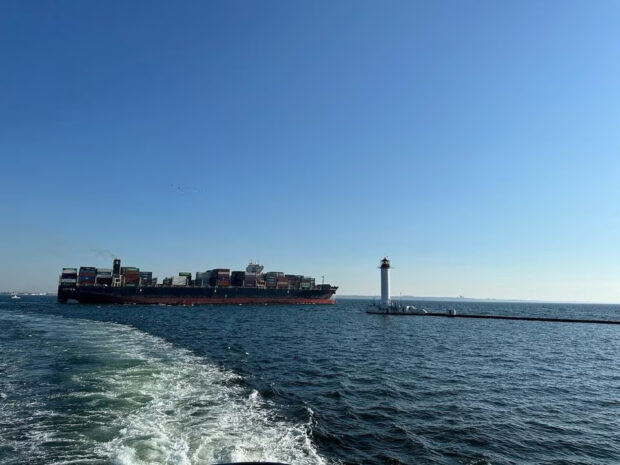Cargo ship leaves Ukrainian port despite Russian threat of attack

Hong Kong-flagged container ship Joseph Schulte leaves the sea port, amid Russia’s attack on Ukraine, in Odesa, Ukraine, in this handout picture released August 16, 2023. Ukrainian Deputy Prime Minister Oleksandr Kubrakov via Facebook/Handout via REUTERS
KYIV — A container ship set off from Ukraine’s Black Sea port of Odesa on Wednesday in a test of Russia’s threat to attack shipping after it abandoned a deal last month allowing Ukraine to export grain.
The departure of the Hong-Kong-flagged Joseph Schulte, which had been in the port since Feb. 23, 2022 – the day before Russia’s invasion – followed a new Russian attack on Ukraine’s grain export infrastructure.
Russian air strikes damaged grain silos and warehouses at one of the Danube river ports, the governor of the Odesa region said, releasing photos showing destroyed storage facilities and piles of scattered grain and sunflowers.
Governor Oleh Kiper said it was a key facility for grains shipments and the president’s chief of staff Andriy Yermak named the port as Reni. There was no immediate comment from Moscow. An industry source said the port was continuing operations.
Benchmark Chicago wheat futures were up about 1% after the news broke on Wednesday morning, adding to a slight earlier gain as they recovered from a two-month low on Tuesday.
Article continues after this advertisementRussia has made regular air strikes on Ukrainian ports and grain silos since pulling out of the U.N.-backed deal in mid-July and has threatened to treat any ships leaving Ukraine as potential military targets. On Sunday it fired warning shots at a ship travelling towards Ukraine.
Article continues after this advertisementDespite the threats, Ukraine last week announced a “humanitarian corridor” in the Black Sea to release cargo ships that have been trapped in its ports, pledging full transparency to make clear they were serving no military purpose.
“A first vessel used the temporary corridor for merchant ships to/from the ports of Big Odesa,” Deputy Prime Minister Oleksandr Kubrakov said on Facebook.
Bernhard Schulte Shipmanagement (BSM), which owns the ship jointly with a Chinese bank, confirmed that the ship was en route to Istanbul.
The ship was carrying more than 30,000 metric tons of cargo in 2,114 containers, Kubrakov said, adding that the corridor would primarily be used to evacuate ships stuck in the Black Sea ports of Chornomorsk, Odesa and Pivdennyi since Russia’s invasion.
Moscow has not indicated whether it would respect the shipping corridor, and shipping and insurance sources have expressed concerns about safety.
Ukraine is a major grain and oilseeds exporter and the United Nations says its supplies are vital to developing countries where hunger is a growing concern.
Battlefield gain
The attacks on Ukraine’s grain followed its launch of a Western-backed counteroffensive in early June to try to dislodge Russian forces the territory they occupy in the south and east.
Extensive Russian fortifications and minefields along the front line have made it hard for Ukrainian forces to break through, but they announced they had retaken another village on Wednesday, the first settlement they have declared recaptured since June 27.
“Urozhaine liberated,” Deputy Defense Minister Hanna Maliar said on Telegram. “Our defenders are entrenched on the outskirts.”
There was no immediate comment from Russia. Russian military bloggers said fierce fighting raged near the village and that Russian units were trying to prevent Ukraine strengthening its positions in Urozhaine.
Reuters was not able to verify the reports.
The village’s recapture would indicate Ukraine is pressing ahead with an offensive drive towards the Sea of Azov just over 90 km (55 miles) to the south, aiming to cut Russian forces occupying its southeastern coastline in half.
Danube ports
Ukraine turned to its Danube river ports after Russia pulled out of the Black Sea grain deal seeking better terms for exports of its own food and fertilizer.
The river ports, which had accounted for around a quarter of grain exports, have since become the main route out for Ukrainian grain, which is also sent on barges to Romania’s Black Sea port of Constanta for shipment onwards.
Earlier this month, Russia attacked Izmail – Ukraine’s main inland port across the Danube River from Romania, sending global food prices higher as it ramped up its use of force to prevent Ukraine from exporting grain.
A Russian warship on Sunday fired warning shots at a cargo ship in the southwestern Black Sea as it made its way northwards, the first time Russia has fired on merchant shipping beyond Ukraine since exiting the grain deal.
Moscow said the ship’s captain had failed to respond to a request to halt for an inspection. Kyiv said the incident was a gross violation of international law and “exemplified Russia’s deliberate policy of endangering the freedom of navigation and safety of commercial shipping in the Black Sea”.
Turkey, which brokered the grain deal alongside the United Nations, has expressed hope that Russia will rejoin it this month.